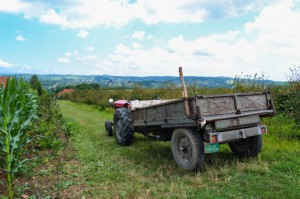Serbia views the Hungarian Land Act as a model to be followed
 “Serbia views the Hungarian Land Act as a model to be followed, is examining several elements of the legislation such as the system of conditions for the acquisition of farmland by foreign nationals, and is thinking of transposing several provisions into the relative Serbian legislation, which is currently under preparation”, Minister of State Attila Juhász from the Serbian Ministry of Agriculture and Environmental Protection said at the 7th session of the Hungarian-Serbian Joint Economic Committee in Belgrade. At the meeting, Hungary was represented by the Ministry of Agriculture’s Deputy State Secretary for International Relations Katalin Tóth.The parties agreed on joint cooperation within the fields of plant production, animal health, animal welfare, agrarian vocational training and feed safety. Discussions were also held on the implementation of joint projects within the fields of sewage treatment, waste management and damage mitigation.
“Serbia views the Hungarian Land Act as a model to be followed, is examining several elements of the legislation such as the system of conditions for the acquisition of farmland by foreign nationals, and is thinking of transposing several provisions into the relative Serbian legislation, which is currently under preparation”, Minister of State Attila Juhász from the Serbian Ministry of Agriculture and Environmental Protection said at the 7th session of the Hungarian-Serbian Joint Economic Committee in Belgrade. At the meeting, Hungary was represented by the Ministry of Agriculture’s Deputy State Secretary for International Relations Katalin Tóth.The parties agreed on joint cooperation within the fields of plant production, animal health, animal welfare, agrarian vocational training and feed safety. Discussions were also held on the implementation of joint projects within the fields of sewage treatment, waste management and damage mitigation.
Deputy State Secretary Tóth stressed that political relations between the two countries are increasingly good and form the foundations for future cooperation. Ms. Tóth indicated that Hungary is striving to maintain and further reinforce the successful professional work completed so far within the fields of agriculture and environmental protection.
At the meeting, Attila Juhász thanked Hungary for the assistance provided in the form of experts and shared experiences within the field of rural development provided within the framework of the EU’s Instrument for Pre-Accession Assistance (IPARD).
Katalin Tóth said that Hungary remains willing to share with Serbia its experiences with relation to legal harmonisation and its practical realisation. According to the Deputy State Secretary, the decree on small-scale producers may be regarded as a textbook example of cooperation with the Serbian party based on the sharing of Hungarian expert knowledge, just as the National Action Plan on the development of ecological farming may also act as a useful guideline for Serbia.
Both parties said they viewed the expansion of cooperation on agricultural trade as important, including within the fields of apple and waterfowl exports and pork processing.










